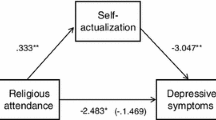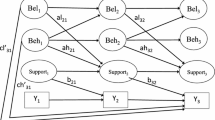Abstract
Previous research has established a relationship between religion and health. However, the specific aspects of religion which may influence health are not fully understood. The present study investigates the effect of religious social support and religious coping on health behaviours, health status and attitudes to health whilst controlling for age and non-religious social support. The results indicate religious coping and religious social support positively impact on self-reported current health status, depression, health outlook and resistance susceptibility. However, negative religious coping was predictive of increased alcohol consumption. Overall congregational support and negative religious coping had the greatest impact on health.
Similar content being viewed by others
References
Bosworth, H. B., Park, K. S., McQuoid, D. R., Hays, J. C., & Steffens, D. C. (2003). The impact of religious practice and religious coping on geriatric depression. International Journal of Geriatric Psychiatry, 18, 905–914.
Bradley, D. E. (1995). Religious involvement and social resources: Evidence from the data set “Americans’ changing lives”. Journal for the Scientific Study of Religion, 34, 259–267.
Bradshaw, M., & Ellison, C. G. (2010). Financial hardship and psychological distress: Exploring the buffering effects of religion. Social Science and Medicine, 71, 196–204.
Cohen, D., Yoon, D. P., & Johnstone, B. (2009). Differentiating the impact of spiritual experiences, religious practices, and congregational support on the mental health of individuals with heterogeneous medical disorders. The International Journal for the Psychology of Religion, 19, 121–138.
Cooper, M. L., Russell, M., & George, W. H. (1988). Coping, expectancies, and alcohol abuse: A test of social learning formulations. Journal of Abnormal Psychology, 97, 218–230.
Dew, R. E., Daniel, S. S., Goldston, D. B., McCall, W. V., Kuchibhatla, M., Schleifer, C., et al. (2010). A prospective study of religion/spirituality and depressive symptoms among adolescent psychiatric patients. Journal of Affective Disorders, 120, 149–157.
Ellison, C. G., & George, L. K. (1994). Religious involvement, social ties, and social support in a southeastern community. Journal for the Scientific Study of Religion, 33, 46–61.
Fiala, W. E., Bjork, J. P., & Gorsuch, R. (2002). The religious social support scale: Construction, validation, and cross-validation. American Journal of Community Psychology, 30, 761–786.
Finch, B. K., & Vega, W. A. (2003). Acculturation stress, social support, and self-rated health among Latinos in California. Journal of Immigrant Health, 5, 109–117.
Fontana, A., & Rosenheck, R. (2004). Trauma, change in strength of religious faith, and mental health service use among veterans treated for PTSD. Journal of Nervous and Mental Disease, 192, 579–584.
Gallup, P. (2011). Religion. http://www.gallup.com/poll/1690/religion.aspx#1. Accessed 24th February 2012.
Gatrell, A. C., & Elliott, S. J. (2009). Geographies of health: An introduction. New York: Wiley.
Hackney, C. H., & Sanders, G. S. (2003). Religiosity and mental health: A meta-analysis of recent studies. Journal for the Scientific Study of Religion, 42, 43–55.
Hasking, P., Lyvers, M., & Carlopio, C. (2011). The relationship between coping strategies, alcohol expectancies, drinking motives and drinking behaviour. Addictive Behaviors, 36, 479–487.
Herbert, R., Zdaniuk, B., Schulz, R., & Scheier, M. (2009). Positive and negative religious coping and well-being in women with breast cancer. Journal of Palliative Medicine, 12, 537–545. doi:10.1089/jpm.2008.0250
Hill, P. C., & Pargament, K. I. (2003). Advances in the conceptualization and measurement of religion and spirituality: Implications for physical and mental health research. American Psychologist, 58, 64–74.
Hoff, A., Johannessen-Henry, C. T., Ross, L., Hvidt, N. C., & Johansen, C. (2008). Religion and reduced cancer risk—What is the explanation? European Journal of Cancer, 44, 2573–2579.
Horning, S. M., Davis, H. P., Stirrat, M., & Cornwell, R. E. (2011). Atheistic, agnostic, and religious older adults on well-being and coping behaviors. Journal of Aging Studies, 25, 177–188.
Hummer, R. A., Ellison, C. G., Rogers, R. G., Moulton, B. E., & Romero, R. R. (2004). Religious involvement and adult mortality in the United States: Review and perspective. Southern Medical Journal, 97, 1223–1230.
Idler, E. L., Musick, M. A., Ellison, C. G., George, L. K., Krause, N., Levin, J. S., et al. (2003). NIA/Fetzer measure of religiousness and spirituality: Conceptual background and findings from the 1998 general social survey. Research on Aging, 25, 327–366.
Ironson, G., Stuetzle, R., & Fletcher, M. A. (2006). An increase in religiousness/spirituality occurs after HIV diagnosis and predicts slower disease progression over 4 years in people with HIV. Journal of General Internal Medicine, 21, S62–S68.
Koenig, H. G., McCullough, M., & Larson, D. B. (2001). Handbook of religion and health. New York: Oxford University Press.
Koenig, H., Pargament, K. I., & Nielsen, J. (1988). Religious coping and health status in medically ill hospitalised older adults. The Journal of Nervous and Mental Disease, 186, 513–521.
Krause, N. (2002). Church-based social support and health in old age: Exploring variations by race. The Journals of Gerontology. Series B: Psychological Sciences, 57, S332–S347.
Krause, N. (2008). Aging in the church: How social relationships affect health. West Conshhocken, PA: Templeton Foundation Press.
Krause, N., Ellison, C. G., Shaw, B. A., Marcum, J. P., & Boardman, J. D. (2001). Church-based social support and religious coping. Journal for the Scientific Study of Religion, 40, 637–656.
La Cour, P., Avlund, K., & Schultz-Larsen, K. (2006). Religion and survival in a secular region: A twenty year follow-up of 734 Danish adults born in 1914. Social Science and Medicine, 62, 157–164.
Lee, B. Y., & Newberg, A. B. (2005). Religion and Health: A review and critical analysis. Zygon, 40, 443–468.
Lundberg, C. D. (2010). Unifying the truths of the world’s religions. New Fairfield, CT: Heavenlight Press.
MacKenzie, E. R., Rajagopal, D. E., Meibohm, M., & Lavizzo-Mourey, R. (2000). Spiritual support and psychological well-being: Older adults’ perceptions of the religion and health connection. Alternative Therapy Health and Medicine, 6, 37–45.
Maman, S., Cathcart, R., Burkhardt, G., Omba, S., & Behets, F. (2009). The role of religion in HIV-positive women’s disclosure experiences and coping strategies in Kinshasa, Democratic Republic of Congo. Social Science and Medicine, 68, 965–970.
Nooney, J., & Woodrum, E. (2002). Religious coping and church-based social support as predictors of mental health outcomes: Testing a conceptual model. Journal for the Scientific Study of Religion, 41, 359–368.
O’Reilly, D., & Rosato, M. (2008). Religious affiliation and mortality in Northern Ireland: Beyond Catholic and Protestant. Social Science and Medicine, 66, 1637–1645.
Pargament, K., Feuille, M., & Burdzy, D. (2011). The brief RCOPE: Psychometric properties of a short measure of religious coping. Religions, 2, 51–76.
Pargament, K. I., Koenig, H. G., & Perez, L. M. (2000). The many methods of religious coping: Development and initial validation of the RCOPE. Journal of Clinical Psychology, 56, 519–543.
Pargament, K. I., Koenig, H. G., Tarakeshwar, N., & Hahn, J. (2004). Religious coping methods as predictors of psychological, physical and spiritual outcomes among medically ill elderly patients: A two-year longitudinal study. Journal of Health Psychology, 9, 713–730. doi:10.1177/1359105304045366
Pirutinsky, S., Rosmarin, D. H., & Pargament, K. I. (2009). Community attitudes towards culture-influenced mental illness: Scrupulosity vs. nonreligious OCD among orthodox jews. Journal of Community Psychology, 37, 949–958.
Pirutinsky, S., Rosmarin, D. H., Pargament, K. I., & Midlarsky, E. (2011). Does negative religious coping accompany, precede, or follow depression among Orthodox Jews? Journal of Affective Disorders, 132, 401–405.
Radloff, L. S. (1977). The CES-D Scale: A self-report depression scale for research in the general population. Applied Psychological Measurement, 1, 385–401.
Rosmarin, D. H., Bigda-Peyton, J. S., Kertz, S. J., Smith, N., Rauch, S. L., & Bjorgvinsson, T. (2013). A test of faith in God and treatment: The relationship of belief in God to psychiatric treatment outcomes. Journal of Affective Disorders, 146, 441–446.
Schmuck, H. (2000). “An act of Allah”: Religious explanations for floods in Bangladesh as survival strategy. International Journal of Mass Emergencies and Disasters, 18, 85–95.
Sherbourne, C. D., & Stewart, A. L. (1991). The MOS social support survey. Social Science and Medicine, 32, 705–714.
Shreve-Neiger, A. K., & Edelstein, B. A. (2004). Religion and anxiety: A critical review of the literature. Clinical Psychology Review, 24, 379–397.
Siegel, K., Anderman, S. J., & Schrimshaw, E. W. (2001). Religion and coping with health-related stress. Psychology and Health, 16, 631–653.
Silton, N. R., Flannelly, K. J., Galek, K., & Ellison, C. G. (2013). Beliefs about God and mental health among American adults. Journal of Religion and Health 1–12. doi:10.1007/s10943-013-9712-3
Simoni, J. M., & Ortiz, M. Z. (2003). Mediational models of spirituality and depressive symptomatology among HIV-positive Puerto Rican women. Cultural Diversity and Ethnic Minority Psychology, 9, 3–15.
Smith, T. B., McCullough, M. E., & Poll, J. (2003). Religiousness and depression: Evidence for a main effect and the moderating influence of stressful life events. Psychological Bulletin, 129, 614–636.
Smith, B. W., Pargament, K. I., Brant, C., & Oliver, J. M. (2000). Noah revisited: Religious coping by church members and the impact of the 1993 midwest flood. Journal of Community Psychology, 28, 169–186.
Smith, M. H., Richards, P. S., & Maglio, C. J. (2004). Examining the relationship between religious orientation and eating disturbances. Eating Behaviors, 5, 171–180.
Sowell, R., Moneyham, L., Hennessy, M., Guillory, J., Demi, A., & Seals, B. (2000). Spiritual activities as a resistance resource for women with human immunodeficiency virus. Nursing Research, 49, 73–82.
Sternthal, M. J., Williams, D. R., Musick, M. A., & Buck, A. C. (2010). Depression, anxiety, and religious life: A search for mediators. Journal of Health and Social Behavior, 51, 343–359.
Swinyard, W. R., Kau, A. K., & Phua, H. Y. (2001). Happiness, materialism and religious experience in the US and Singapore. Journal of Happiness Studies, 2, 13–32.
The WHOQOL-SRPB Group, & Skevington, S. M. (2006). A cross-cultural study of spirituality, religion, and personal beliefs as components of quality of life. Social Science and Medicine, 62, 1486–1497.
Uchino, B. N. (2005). Social support and physical health: Understanding the health consequences of relationships. American Journal of Epidemiology, 161, 297–298.
Uchino, B. N., Uno, D., & Holt-Lunstad, J. (1999). Social support, physiological processes, and health. Current Directions in Psychological Science, 8, 218–221.
van Olphen, J., Schulz, A., Israel, B., Chatters, L., Klem, L., Parker, E., et al. (2003). Religious involvement, social support, and health among African-American women on the east side of Detroit. Journal of General Internal Medicine, 18, 549–557.
Ware, J. E., Davies-Avery, A., & Donald, C. A. (1978). Conceptualization and measurement of health for adults in the health insurance study: General health perceptions. Santa Monica, CA: Rand Corporation.
Winter, U., Hauri, D., Huber, S., Jenewein, J., Schnyder, U., & Kraemer, B. (2009). The psychological outcome of religious coping with stressful life events in a Swiss sample of church attendees. Psychotherapy and Psychosomatics, 78, 240–244.
Yong, H. H., Hamann, S. L., Borland, R., Fong, G. T., Omar, M., & for the ITC-SEA project team. (2009). Adult smokers’ perception of the role of religion and religious leadership on smoking and association with quitting: A comparison between Thai Buddhists and Malaysian Muslims. Social Science and Medicine, 69, 1025–1031.
Author information
Authors and Affiliations
Corresponding author
Rights and permissions
About this article
Cite this article
Brewer, G., Robinson, S., Sumra, A. et al. The Influence of Religious Coping and Religious Social Support on Health Behaviour, Health Status and Health Attitudes in a British Christian Sample. J Relig Health 54, 2225–2234 (2015). https://doi.org/10.1007/s10943-014-9966-4
Published:
Issue Date:
DOI: https://doi.org/10.1007/s10943-014-9966-4




